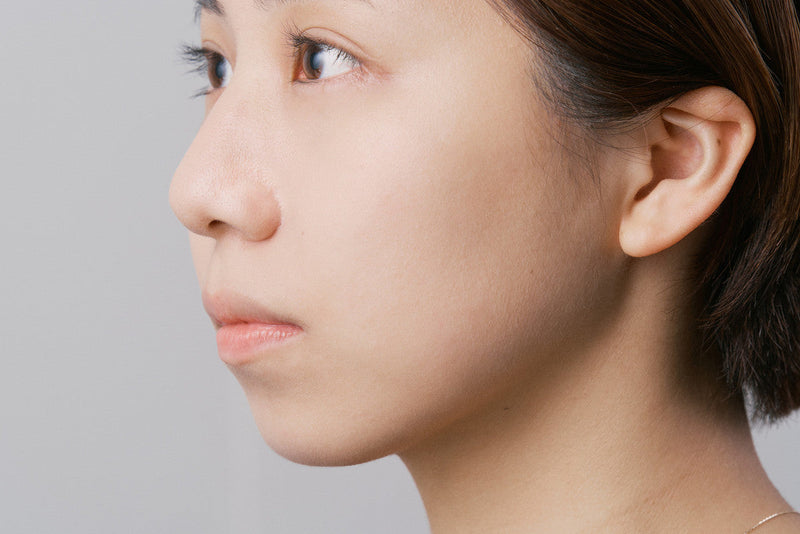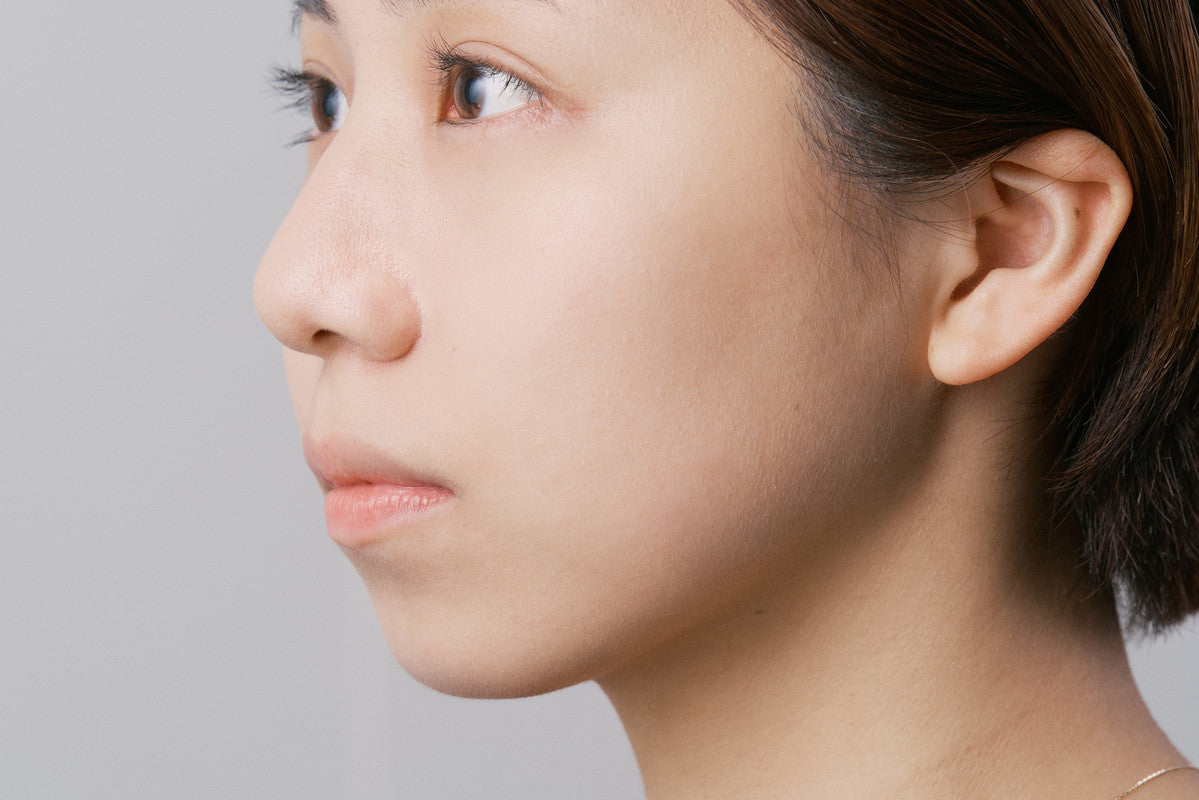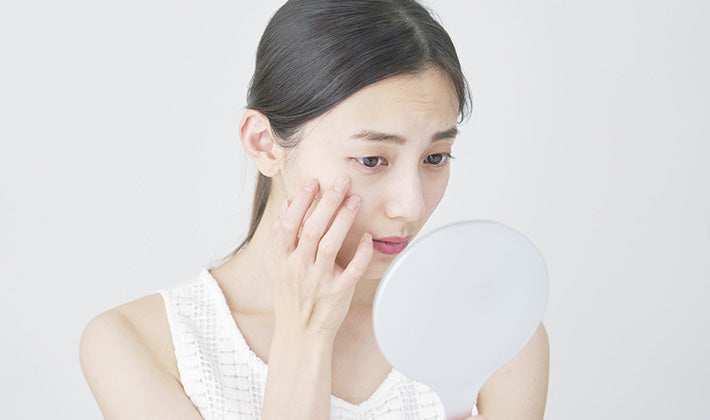
#irritated skin #Skin Problem
2024/07/26
Common Pore Care Misunderstanding and How to Care for Your Pores Properly
Topic
What exactly are pores, and what purpose do they serve?

The surface of your skin is not perfectlly smooth. It consists of small raised areas called "skin ridges" and tiny depressions known as "furrows." When these features are consistent and well-arranged, they give the skin a smooth and refined appearance. When skin ridges are irregular or disordered, light reflection off the skin becomes uneven. This can result in a dull complexion and exaggerate the visibility of pores, making them appear more noticeable.
Pores are not just simple openings on the skin; they are essential for the excretion of sebum (skin oil) and sweat. Together, these secretions form a protective barrier called the "acid mantle" on the skin's surface. This barrier helps maintain moisture balance and shields the skin from bacteria and other microorganisms. The skin's sweat glands release sweat through pores, which is important for controlling body temperature. While having pore-free skin is attractive, it's vital to note that pores play an important role in overall skin health and appearance.
What causes pores to be noticeable?
1. Pores are not closing properly.
Pores play a crucial role in regulating sebum production, and they open and close accordingly. When sebum production is high, the pores may remain open, which can lead to blackheads and an appearance of enlarged pores.
2. Loss of skin elasticity.
The size of pores is influenced by various factors such as genetic factors, lifestyle habits, and climate. Excess sebum and dead skin cells can accumulate within pores, causing them to stretch and become more visible. Aging leads to reduced collagen production and loss of elasticity, further contributing to the appearance of larger pores. Visualize the aging process on pores by imagining a hole punched in a stretchy fabric. As you stretch the material, the hole enlarges. Similarly, age weakens our skin's support structure, and gravity pushes the skin lower, making pores look larger.
How to check if your enlarged pores are caused by sagging skin : Look in the mirror and use your palms to gently lift your cheeks upward. If your pores appear smaller while doing this, it might be a sign that sagging skin is contributing to the appearance of enlarged pores.

Pores are often most visible during our early twenties, when our skin produces the most sebum. Later, usually in our late 30s and 40s, a decrease in skin elasticity becomes the more common reason for enlarged pores.
Furthermore, pore size and visibility can differ across different parts. The T-zone (forehead, nose, and chin) typically has more noticeable pores because these areas produce more sebum. On the other hand, areas like eyelids, buttocks, and inner arms produce less sebum, making pores less visible.
Pore Care Misunderstandings: A Guide to Achieving Healthy-Looking Pores
Pores are a common concern for many people, but improper care methods can worsen their appearance.
This article aims to debunk common pore care myths and provide guidance on the right approach to achieve healthier-looking pores.
Misunderstanding 1: Open Pores Lead to Enlargement
Some believe that open pores continuously enlarge over time. Contrary to this belief, pore size is primarily genetic and doesn't grow larger simply from being open. Although open pores are more susceptible to gathering dirt and oil, making them more noticeable, their actual size remains unchanged. These impurities can result in acne or inflammation, further stretching pores or causing pigmentation that makes them appear larger.
Conversely, some people think that tightening pores will make them smaller, but the truth is that focusing on restoring healthy pore function is more important than trying to change their size. When pores open and close naturally, they become less noticeable. Properly washing your face is crucial to addressing pore concerns. Although many people wash their faces daily, not everyone does it correctly. Some believe that cold water shrinks pores. Although cold water temporarily constricts pores, it doesn't improve their natural ability to open and close. It may also prevent thorough cleansing, leaving behind dirt and oil. It's best to use lukewarm water for washing your face. Hot water should be avoided as it can remove essential oils, causing dryness and irritation.
People often only use products made for pores but forget important skincare steps like using sunscreen and moisturizing. However, protecting your skin from the sun, keeping it hydrated, and eating healthy are all key to having healthy pores.
When your skin has the right balance of moisture and oils, your pores open and close better, making them less noticeable.
Spending too much time in air-conditioned spaces or not sweating enough can affect your pores. Activities that make you sweat, like saunas or hot yoga, can help your pores work better. To take care of your pores, remember to use sunscreen, moisturize, and live a healthy life.
Misunderstanding 3: Trying Too Hard to Remove Sebum Plugs
Our skin naturally produces sebum, which combines with sweat to form the protective acid mantle. However, when sebum becomes trapped in pores and hardens, sebum plugs or blackheads form, leading to clogged pores.
It's common for people to try squeezing out blackheads, but this can damage the skin, causing breakouts and inflammation.
The right way to handle blackheads is by gently removing them through appropriate cleansing and exfoliation. If a blackhead is difficult to remove, don't force it, as this could damage your skin. Instead, prioritize enhancing your skin's natural shedding process to encourage their expulsion. As metabolism slows down, the skin's ability to expel sebum also slows, which can lead to chronic clogging and inflammation. Forcing out blackheads may result in scarring and dark spots.
Remember that pore care takes time, and focusing on improving your skin’s overall health is key.
5 Essential Daily Tips for Tighter Pores
1. Get Enough Sleep for Healthy Skin Cell Turnover
Aim for 7-8 hours of sleep each night to promote skin repair and regeneration. Sleep deprivation can negatively impact this process, making pores more noticeable. Creating a regular sleep schedule ensures your skin receives the rest it needs for a healthier, more vibrant look.
2. Regulating Sebum Production Through Balanced Nutrition
Your food choices affect skin health. focus on consuming vitamin and antioxidant-rich foods like fruits, vegetables, and nuts. Additionally, restricting your intake of sugar and fatty foods aids in controlling sebum production and reducing clogged pores.
3. Regular Exercise: Sweating Is The Best Skin Care
Exercise boosts skin health by enhancing circulation, metabolism, and toxin removal. It also promotes healthy pore function, making pores appear smaller for a smoother complexion.
4. Stress Management
Stress can cause hormonal imbalances, leading to increased sebum production and pore-related problems. Engage in stress-reducing activities like meditation, yoga, or hobbies to lessen their effect on your skin's health and appearance.
5. Select The Right Skin Care Products
Selecting products that match your skin type is key to achieving optimal results. Toners, lotions, and serums can moisturize, improve skin texture, and reduce pore visibility. By following these five tips and making necessary lifestyle changes, you can effectively prevent and improve enlarged pores, leading to firmer, smoother, and more refined skin. Just remember, the key to success is consistency!
Conclusion

Achieving refined pores requires a holistic strategy that combines daily skincare with healthy lifestyle choices. Focus on getting enough sleep, maintaining a balanced diet, and exercising regularly to reduce stress, boost metabolism, and improve the skin’s natural healing process. While internal care is essential, selecting the right skincare products is equally important. Consider using collagen-rich products like "Domohorn Wrinkle," which provides deep hydration, resulting in smoother, more refined skin with minimized pore appearance.





